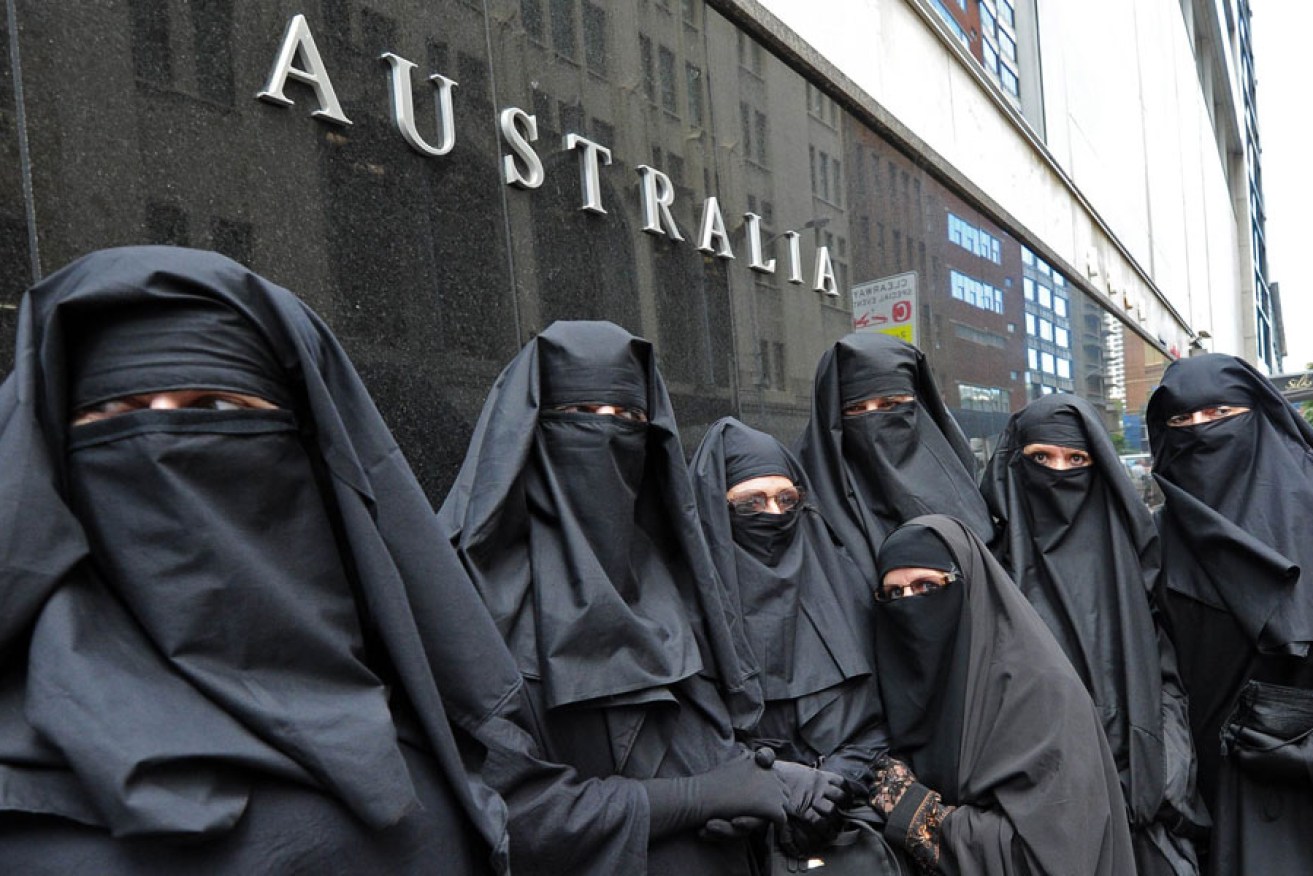The burqa, hypocrisy and short memories


Men and women from the group Faceless call for the banning of the burqa at a rally in Sydney in 2012.
Prime Minister Tony Abbott is getting plenty of flak for admitting yesterday that he finds the burqa confronting; curiously, his words are almost exactly the same as those used by Julia Gillard in 2010, when this debate had its last national outing.
Back then, Deputy Prime Minister Gillard had this to say: ”I can understand Australians that do find it a bit confronting; it’s a little different on our streets. It’s something for people to think about. I don’t think it actually makes a difference trying to ban an article of clothing; I’m not sure that’s what we want to do.”
Yesterday, Abbott said said he found the covering worn by some Muslim women “a fairly confronting form of attire”, but didn’t support a ban.
“Frankly, I wish it was not worn, but we are a free country,” he said.
He was immediately lambasted by the Opposition and fellow travellers for inflaming debate (they seemed to have forgotten Gillard’s previous contribution), but this extreme response only serves to heighten the more unfortunate aspects of the current outbreak of “ban the burqa” fervour.
READ MORE: Australian political leaders’ views on the burqa; Burqas banned from Parliament’s public gallery
The difference between now and 2010 is that the debate comes as the country essentially goes to war in the Middle East against the Islamic State jihadists, just after we’ve raised our terror alert level to “high”, and after numerous Police anti-terror operations, including one that resulted in a Melbourne teenager attacking two officers and being shot dead.
Muslims across Australia are reporting more frequent incidents of abuse against them and several people have been charged for attacks which appear on the face of it to be motivated by anti-Islamic hatred.
In other words, it is a delicate and troubled time in our national life.
And yet, the likes of Palmer United Senator Jacqui Lambie and South Australian Liberal Senator Cory Bernardi seem to believe this is a good time to debate the clothing worn by Muslim women, saying the head covering should not be allowed in Parliament or indeed any public places.
No matter that no-one can remember anyone ever wearing a burqa into Parliament and that Muslim leaders say it remains a rare form of dress in Australia (the burqa is a full covering from head to toe, with mesh covering the eyes; the niqab is a cloth which covers the face, leaving the eyes visible; while a hijab is a head and upper chest covering only, leaving the face visible).
In France, this debate has been settled. The country has banned face coverings in public – including balaclavas and hoods – in a move widely criticised for targeting Muslim women.
Are people safer in France as a result of the ban? That is unclear, however, as this article points out, a French study has pointed to “an increase in intolerance, even violence, towards women wearing face veils after the introduction of the ban in those countries”.
In the environment of heightened fear and tension in Australia, it should be obvious that this debate needs to be conducted carefully.
That seems a vain hope. Talkback radio is all over the issue today, with Muslim leaders again nervously pleading for calm heads.
While the daily news cycle is chewing up Abbott’s comments, using Lambie and Bernardi as fodder, and presenting all kinds of unfortunate linkages – intentionally or unintentionally – between innocent Australian women who wear Islamic dress and the murderous sociopaths of Islamic State, the bigger picture of modern history provides a cautionary lesson.
Does it need to be pointed out that hatred of entire groups of people based on religion, ethnicity or race was a driving force in every genocidal conflict of the past 100 years? Does it needed to be pointed out that we therefore need to proceed very carefully in discussions that target particular ethnic or religious groups?
While Abbott – and Gillard – are right that many Australians find the burqa confronting, the real question is why?
There’s a legitimate debate to be had about what the burqa says about the rights of women and, perhaps, the ability of security officers to make proper identity checks (although that doesn’t seem to be a widespread problem).
But that’s not what’s being debated here, particularly given the context.
What we’re really debating is the place of Muslims in Australian society.
And that discussion requires a great deal more care and intelligence than that being exercised at the moment.




